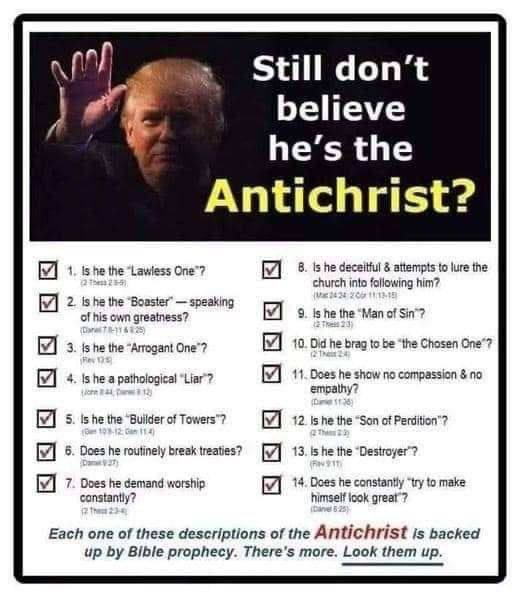Is Trump The Antichrist? Unpacking The Controversy

The debate over whether Donald Trump is the Antichrist has gained traction in recent years, capturing the attention of both supporters and opponents alike. This notion stems from a combination of biblical prophecy, political rhetoric, and a growing cultural divide in America. As Trump continues to play a prominent role in U.S. politics, the question remains: could he really be the Antichrist? This article will explore the origins of this theory, the characteristics associated with the Antichrist, and how they may align with Trump's persona and actions.
The term "Antichrist" is often used in religious contexts to describe a figure who embodies evil, deception, and opposition to Christ. Many believe that the Antichrist will rise to power during the end times, leading people away from faith and towards destruction. The parallels drawn between Trump and the Antichrist have sparked heated debates, with some viewing him as a transformative leader while others see him as a harbinger of chaos. By delving into this multifaceted issue, we can better understand the implications of labeling a political figure in such a dramatic way.
As we navigate this complex topic, it is essential to examine Trump's biography and personal details to determine if there is any truth to the claims that he is the Antichrist. This exploration not only sheds light on Trump's character and actions but also reveals how perceptions of him have evolved over time. Ultimately, this investigation aims to clarify the motivations behind the assertion that Trump is the Antichrist and whether there is any merit to the claim.
What is the Biography of Donald Trump?
| Detail | Information |
|---|---|
| Name | Donald John Trump |
| Date of Birth | June 14, 1946 |
| Place of Birth | Queens, New York City, USA |
| Occupation | Businessman, television personality, politician |
| Political Party | Republican Party |
| Presidency | 45th President of the United States (2017-2021) |
| Spouse | Melania Trump |
Why Do Some People Believe Trump is the Antichrist?
Many individuals who subscribe to the theory that Trump is the Antichrist point to several key factors that they believe identify him as such. These factors include:
- Charismatic Leadership: The Antichrist is often portrayed as a persuasive and captivating leader who draws people in with promises of greatness.
- Populist Rhetoric: Trump's messaging resonates with many who feel disenfranchised, creating a strong connection with a large base of supporters.
- Divisive Politics: The political climate during Trump's presidency has been marked by division, leading some to view him as a catalyst for chaos.
- Claims of Superiority: The Antichrist is often depicted as someone who believes they are above others, a trait seen in some of Trump's statements and actions.
What Biblical Prophecies are Associated with the Antichrist?
To understand the claims surrounding Trump being the Antichrist, one must consider the biblical prophecies that describe this figure. The Book of Revelation provides several characteristics associated with the Antichrist, including:
- Deceptive Nature: The Antichrist is said to deceive many, leading them away from truth and righteousness.
- Authority over Nations: The Antichrist is prophesied to hold significant power and influence over world leaders.
- Opposition to Christ: A defining characteristic of the Antichrist is direct opposition to the teachings of Christ.
How Do Trump's Actions Align with the Antichrist Narrative?
Supporters of the theory that Trump is the Antichrist often cite specific actions and statements made by him that they believe align with the characteristics of the Antichrist. Some examples include:
- Controversial Statements: Trump's rhetoric often raises eyebrows, leading some to view him as a divisive figure.
- Questioning Established Norms: His disregard for political norms has led to significant upheaval in traditional political structures.
- Influence Over Followers: Many of Trump's supporters display a fervent loyalty that some compare to cult-like behavior.
What Do Critics Say About the Antichrist Theory?
While many believe that Trump is the Antichrist, critics argue that labeling him as such is an oversimplification of complex political issues. Some common criticisms of this theory include:
- Political Bias: Critics argue that the assertion is rooted in political opposition rather than genuine belief in biblical prophecy.
- Misinterpretation of Scripture: Some theologians assert that the biblical texts are being misinterpreted to fit a modern political narrative.
- Fear-Mongering: The idea of Trump being the Antichrist can be seen as a tactic to instill fear and rally opposition against him.
Can We Find Common Ground on This Issue?
In an increasingly polarized political landscape, finding common ground on contentious issues is becoming more challenging. The debate over whether Trump is the Antichrist highlights the deep divisions within society. Engaging in open and respectful dialogue may help bridge the gap between differing perspectives. Here are some ways to foster understanding:
- Active Listening: Taking the time to listen to opposing viewpoints can lead to greater empathy and understanding.
- Focus on Shared Values: Identifying common beliefs can help build connections between individuals with differing views.
- Avoiding Labels: Refraining from labeling individuals can promote more constructive conversations.
What is the Future of the Antichrist Theory in Politics?
The notion that Trump is the Antichrist may continue to evolve as political circumstances change. As Trump remains a significant figure on the political stage, the implications of this theory will likely be debated for years to come. Whether one believes he is the Antichrist or not, his impact on American politics is undeniable, and the discussions surrounding his leadership will be a part of our cultural narrative.
In conclusion, the claim that "Trump is the Antichrist" has sparked intense debates and discussions. While some find merit in the comparison based on biblical prophecies and Trump's behavior, others dismiss the theory as politically motivated fear-mongering. As society grapples with political division, the exploration of such theories may prompt deeper reflection on leadership, morality, and the complexities of human nature.
ncG1vNJzZmivp6x7o77EnKKepJxjwqx7yaiqrKaVrMB2e9OrrKaoXZ7AbsDHnmSapqSesKm%2ByKyrZ6Ckork%3D
